The Richard Wright Center on the Road!
Kathi Griffin–Director of RWC
Fifteen years ago, while working as writing center coordinator at Millsaps College, I asked if I could attend a writing center event at Tougaloo College. When the director said yes, I asked if I could invite other writing center folks I knew from Mississippi College and Jackson State University. When the event was over, we decided we liked talking to each other–and the Mississippi Writing Center Association (MSWCA) was born. It's had its ups and downs, ins and outs, but it's still going–and now stronger than ever. It's gratifying, to say the least. But what I find most rewarding is the sense of community, of helping change the educational landscape of Mississippi–for the better. Last year we hosted MSWCA in Innovate–the first conference to be held there–and we got to show off our fancy new center.
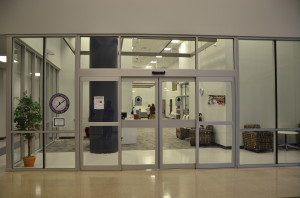 This year the conference was hosted by the Department of Writing and Rhetoric at the University of Mississippi. We traveled to Oxford, where more than 70 folks gathered from all parts of MS–from high schools and community colleges, from private and public four-year institutions, directors and tutors, graduate and peer tutors. And this year, we presented research from our own center, three of us: director, coordinator, and graduate assistant. We were joined by two other graduate assistants who share their experiences below. The response we received from our colleagues has helped us deepen our understanding of our research, which we will write up to submit for publication.
This year the conference was hosted by the Department of Writing and Rhetoric at the University of Mississippi. We traveled to Oxford, where more than 70 folks gathered from all parts of MS–from high schools and community colleges, from private and public four-year institutions, directors and tutors, graduate and peer tutors. And this year, we presented research from our own center, three of us: director, coordinator, and graduate assistant. We were joined by two other graduate assistants who share their experiences below. The response we received from our colleagues has helped us deepen our understanding of our research, which we will write up to submit for publication.
Below you can learn more about our research, about the keynote speaker–Dr. Vershawn Ashanti Young, whom we hope to bring to JSU–and about the fun we had being "on the road."
“A Deeper Understanding”
Daoying Liu–Graduate Assistant and Tutor
The conference was an academically rewarding and memorable experience for me. I presented our research with Dr. Griffin and Dr. Glushko on “Searching for Evidence of Our Effectiveness.” The presentation was focused on how we might evaluate the effectiveness of the Richard Wright Center. Audiences from different writing centers of Mississippi raised questions on how to conduct a discourse analysis and how to interpret the data in the writing center. The audience members also shared their experiences. Interaction with peer professionals helped me with a deeper understanding our current research project and directions for future research. 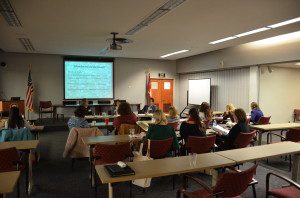
In addition, I also attended a couple of panel presentations and workshops. Presentations offered me an opportunity to know what other professionals are doing, and inspire reflections on what I am doing now. My interest was captured by one workshop “Preparing Tutors to Work with Multimodal Assignments.” Multimodal assignments can help student writers improve their visual and digital literacy, especially their genre awareness in writing. We shared our experiences on how to assign a multimodal assignment and what we expected from student writers to fulfill this genre-based task. We also discussed how to provide trainings on preparing tutors in response to new digital assignments other than traditional print essays. This was really a wonderful academic trip.
“My First Conference”
Christopher H. Crump–Graduate Assistant and Tutor
I always imagined that attending my first conference would be a big deal. There would be people of a certain intellectual caliber sitting in stuffy rooms, the air thick with the smell of fine, hand-rolled cigars and well-aged Scotch; ideas wielded in the King's English, as if they were the fire of Prometheus itself; me, huddled in a corner, lamenting my own lack of genius, aspiring to the greater heights of academia. Also, for some reason or another, there were tuxedos, monocles, and evening gowns.
Then, I actually went to a conference . . .
and it was nothing as I had imagined it, of course. The atmosphere at the conference was very relaxed. The keynote speaker, Dr. Vershawn Ashanti Young, led several discussions on the use of code-meshing, and its place in writing centers and society as a whole. I was even lucky enough to be able to pick his brain during a small impromptu group discussion shortly after. People mingled and shared their stories as tutors. They gave presentations on the future of writing centers, both in practice and technologically. They agonized over the ridiculous nature of page requirements. They were nervous, confident, tyro, and experienced. They were people. They were me.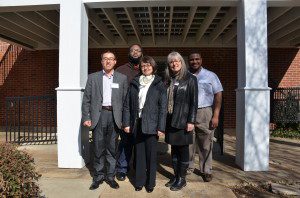
“The Questions of the Century”
Christopher Peace–Adjunct Instructor, Graduate Student, and Former Tutor
Last month I was given the opportunity to attend the MSWCA Conference with members from the Richard Wright Center. Held at the University of Mississippi, this two-day long event was filled with educational epiphanies, good food, great communication, and exciting activities. Dr. Vershawn Young was the keynote speaker of the conference, and he was one of the most fascinating parts of the entire conference. Dr. Young’s talks on African American English (AAVE) and code-meshing in the classroom and writing center sparked several discussions throughout the event. He proposed that people’s variant “Englishes” should be accepted in the learning space as a cultural resource instead of an educational hindrance. Getting an education should not erase one’s cultural, linguistic upbringing in favor for an elitist mode of academia. Dr. Young stated that the acceptance of AAVE in academia will be the big question of this century.
We attended several sessions throughout the day on Thursday that varied in topics. I sat in on sessions about online tutoring and thesis statement development. One main motif of these sessions was making the writing comfortable in any medium. If the writer understands the agency they have with their writing, then the writing process would go more smoothly. Our writing center group also visited William Faulkner’s home in Oxford, after trekking through a nature trial close by. We prayed that Faulkner’s creative energy would inspire us to write and create. We also visited a blacksmith at The Treehouse Gallery on the edge of town. All in all, the trip really helped me relax and aided my pedagogical approach to teaching writing in the academic space.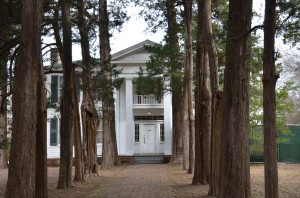
“A Walk in the Woods”
Tatiana Glushko–RWC Coordinator
What I liked most about the conference was the atmosphere—friendly and comfortable, almost homelike. It was a small conference where you could meet your colleagues–all of whom are extremely enthusiastic about the writing center work–to share your experience, and to hear from others about their innovations in the writing center. I enjoyed hearing the keynote speaker, Dr. Vershawn Ashante Young from University of Waterloo, Ontario, who introduced the participants to his theory of code-meshing and discussed how this theory could be used to help overcome the privileging of one language variety (e.g., Standard American English) over another (e.g., African American English) in teaching and in the writing center work.
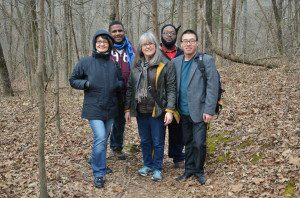 After the conference, we visited William Faulkner’s house Rowan Oak and walked in the woods surrounding it. We also stopped by the Treehouse Gallery located outside Oxford to see the works of local artists. The trip back to Jackson was far from boring: Beautiful music selection (courtesy of Chris Crump) that included jazz compositions and Bach’s Chaconne played by Nathan Milstein made the 2.5-hour ride worthwhile.
After the conference, we visited William Faulkner’s house Rowan Oak and walked in the woods surrounding it. We also stopped by the Treehouse Gallery located outside Oxford to see the works of local artists. The trip back to Jackson was far from boring: Beautiful music selection (courtesy of Chris Crump) that included jazz compositions and Bach’s Chaconne played by Nathan Milstein made the 2.5-hour ride worthwhile.
